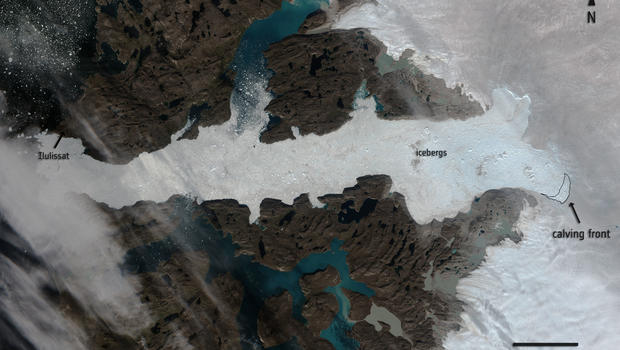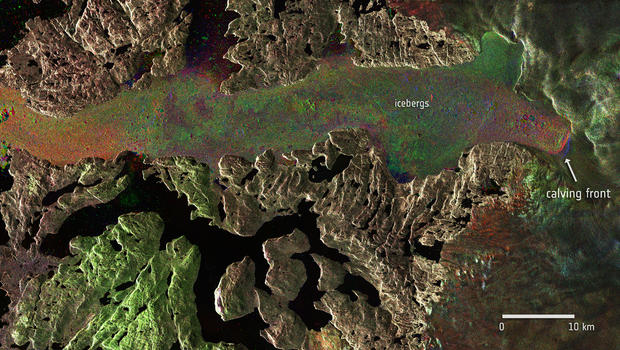Results 1 to 1 of 1
Thread Information
Users Browsing this Thread
There are currently 1 users browsing this thread. (0 members and 1 guests)
-
08-24-2015, 09:57 PM #1
Greenland glacier loses chunk the size of Manhattan
By AMANDA SCHUPAK CBS NEWS August 24, 2015, 5:31 PM
Greenland glacier loses chunk the size of Manhattan
 This optical image of Jakobshavn glacier in western Greenland, acquired by Sentinel-2A on 16 August 2015, offers a valuable perspective of the scale of the calving event that took place between 14 and 16 August. The contour indicates the area of ice lost between images acquired on 6 and 16 August.COPERNICUS SENTINEL DATA (2015)/ESA
This optical image of Jakobshavn glacier in western Greenland, acquired by Sentinel-2A on 16 August 2015, offers a valuable perspective of the scale of the calving event that took place between 14 and 16 August. The contour indicates the area of ice lost between images acquired on 6 and 16 August.COPERNICUS SENTINEL DATA (2015)/ESA
Satellite images show that the world's fastest moving glacier lost a piece of ice measuring nearly 5 square miles over two days. Scientists say it is one of the most significant calving events on record.
Radar images of the Jakobshavn glacier in Greenland, taken from the European Space Agency's (ESA) Sentinel-1A and Sentinel-2A weather satellites between July 27 and Aug. 19, show the massive glacier advancing westward before its front rapidly retreated as a huge chunk fell off it front, sometime between Aug. 14 and Aug. 16.
The ESA estimates that the ice is about 1,400 meters (4,600 feet) thick, meaning that the piece lost has a volume of about 17.5 cubic km, which is enough to cover the island of Manhattan in a layer of ice almost 1,000 feet deep.
 Radar images from Sentinel-1A captured the Jakobshavn glacier in western Greenland before and after a massive calving event, which took place between 14 and 16 August 2015. The image composite includes different Sentinel-1A images from 27 July, and 13 and 19 August. The red, green and blue indicate the position of the calving front and other dynamic features on each respective date.
Radar images from Sentinel-1A captured the Jakobshavn glacier in western Greenland before and after a massive calving event, which took place between 14 and 16 August 2015. The image composite includes different Sentinel-1A images from 27 July, and 13 and 19 August. The red, green and blue indicate the position of the calving front and other dynamic features on each respective date.
COPERNICUS SENTINEL DATA (2015)/ESA
Similar events have taken place before, for example in July 2010, but the area of this calving is nearly twice the size of that event.
Greenland is the world's second largest ice body, and melting of its ice sheet contributes about 40 percent of current sea level rise. Jakobshavn glacier drains 6.5 percent of the Greenland ice sheet and produces and tenth of its icebergs -- totaling 35 million tons of ice calved each year.
According to a wide-ranging new study published earlier this month in the Journal of Glaciology by the World Glacier Monitoring Service, in the first part of the 21st century, glaciers are melting faster than at any point in the last 165 years -- and possibly any point in recorded history.
http://www.cbsnews.com/news/greenlan...-of-manhattan/NO AMNESTY
Don't reward the criminal actions of millions of illegal aliens by giving them citizenship.
Sign in and post comments here.
Please support our fight against illegal immigration by joining ALIPAC's email alerts here https://eepurl.com/cktGTn
Similar Threads
-
Greenland Glacier Sheds Another Big Chunk
By JohnDoe2 in forum Other Topics News and IssuesReplies: 0Last Post: 06-12-2014, 01:29 PM -
Greenland glacier hits record speed
By JohnDoe2 in forum Other Topics News and IssuesReplies: 0Last Post: 02-04-2014, 01:28 PM -
Humongous iceberg breaks away from Greenland glacier
By JohnDoe2 in forum Other Topics News and IssuesReplies: 0Last Post: 07-17-2012, 05:19 PM -
Giant ice 'island' breaks off Greenland glacier
By JohnDoe2 in forum Other Topics News and IssuesReplies: 0Last Post: 08-06-2010, 07:02 PM -
Big chunk of Greenland glacier breaks off
By JohnDoe2 in forum Other Topics News and IssuesReplies: 8Last Post: 07-14-2010, 03:00 PM


 LinkBack URL
LinkBack URL About LinkBacks
About LinkBacks




 Reply With Quote
Reply With Quote


1,300 Migrants swarm NYCís City Hall over false rumor of green...
04-25-2024, 07:27 AM in General Discussion